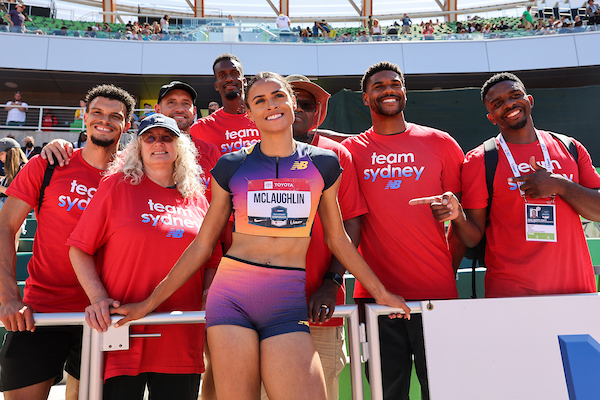Hypothetical Scenario: Sydney McLaughlin Rejecting a $450 Million BBC Billboard Deal
Sydney McLaughlin is one of the most accomplished athletes in the world, known for her groundbreaking achievements in track and field, particularly in the 400m hurdles. As an Olympic gold medalist and world record holder, she commands considerable attention from major brands looking to align with her image. The idea of rejecting a multi-million-dollar offer, especially something as significant as $450 million, would be highly newsworthy and would likely involve a deep dive into her career, values, and approach to endorsements.
Here’s a detailed look at how such a situation could unfold in terms of branding, personal choice, and public perception:
1. Understanding the Offer
In a hypothetical scenario, if Sydney McLaughlin were presented with an offer of $450 million, it would be part of a large-scale advertising campaign. BBC, a global media outlet, might have planned to use McLaughlin’s image for an extensive marketing initiative. This could involve:
- Billboards: Major cities around the world, with her iconic athletic pose, showcasing her achievements.
- TV Commercials: BBC, with its reach across different platforms, could have made her the face of a campaign that spans globally.
- Public Appearances: Part of the agreement could have involved speaking engagements, media interviews, and even product endorsements.
A deal of this magnitude would involve not just her image, but her association with certain values and ideals. As an athlete, she has become an icon of hard work, discipline, and excellence. This could influence her decision to accept or reject such an offer.
2. Personal Values and Image Control
McLaughlin is known for maintaining a low-key, humble public persona, with a focus on her athletic career and her faith. Rejecting a massive endorsement deal could signal several things:
- Focus on Athletic Integrity: McLaughlin may wish to keep her image closely aligned with the sport, distancing herself from potential over-commercialization. High-profile deals could sometimes be seen as a distraction from an athlete’s core identity and career goals.
- Avoiding Overexposure: Athletes like McLaughlin often walk a fine line between maintaining public interest and staying relevant without saturating the market. There could be concerns about losing her authentic self in the face of such a massive offer.
- Brand Alignment: She may prefer working with certain brands or organizations that align more with her values, which might not include a deal with BBC or the nature of the project they were offering.
3. Financial Considerations
While $450 million is an extraordinarily high figure, McLaughlin’s existing partnerships and financial stability might reduce the appeal of such an offer. If she’s already financially secure from previous endorsement deals, the rejection could be viewed as a more thoughtful decision.
Many top-tier athletes such as McLaughlin may have earned substantial wealth from deals with global brands, such as Nike, and other high-paying endorsements. When an athlete reaches a certain financial threshold, they might prioritize career goals and personal well-being over a one-off financial gain.
4. The Role of Media and Public Perception
In the age of social media and instant news, the rejection of such a deal would be highly scrutinized by both fans and critics. McLaughlin’s reasons for rejecting the offer could be framed in various ways:
- Strengthening Brand Image: By turning down an extremely lucrative deal, McLaughlin could be seen as someone who is selective about her brand partnerships, signaling a commitment to maintaining her authentic self and focusing on her athletic achievements.
- Relatability: Athletes often serve as role models, especially for younger fans. McLaughlin’s rejection of a massive financial offer could make her more relatable to her audience. It might be seen as a reminder that personal values and principles can sometimes outweigh financial gain.
- Publicity Impact: In many ways, rejecting such a deal could create a positive publicity wave for McLaughlin. It could highlight her integrity, personal beliefs, and commitment to her career, ensuring her place in history as a respected figure both on and off the track.
5. Endorsement Deals and Athlete Control
In McLaughlin’s case, it’s also possible that she is highly selective with her endorsements, carefully choosing those that align with her message and goals. Some athletes, particularly those at the peak of their careers, prefer to remain in control of their public image, and not every deal may feel like the right fit.
This level of control could be essential for McLaughlin, especially since her image is so carefully managed. A $450 million deal, while significant, might come with demands that compromise her authenticity or professional focus.

Leave a Reply